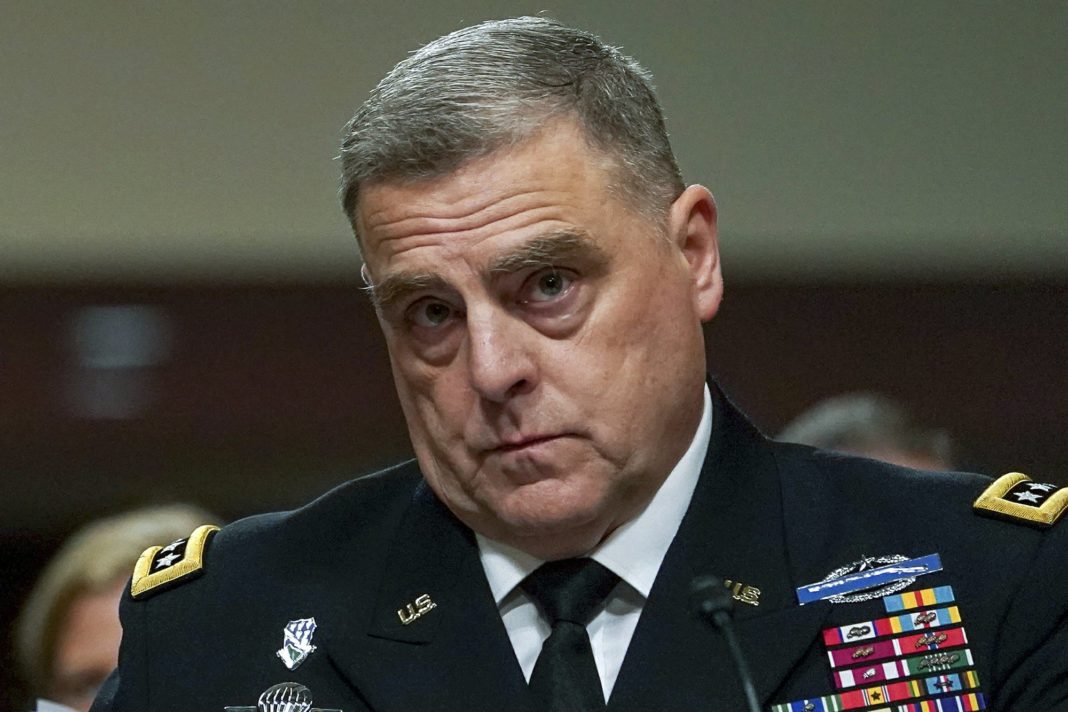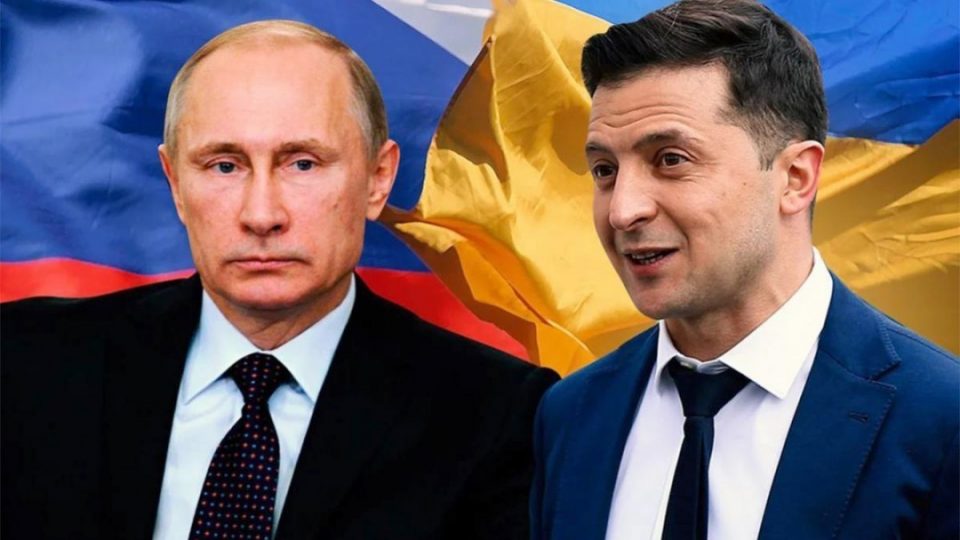
Joint Chiefs chair Gen. Mark A. Milley calls for Ukrainians to cement their gains at the bargaining table.
Top US General Urges Diplomacy in Ukraine
While Biden Advisers Resist
Helene Cooper, Zach Montague and Andrew E. Kramer / The New York Times
WASHINGTON (November 11, 2022) — A disagreement has emerged at the highest levels of the United States government over whether to press Ukraine to seek a diplomatic end to its war with Russia, with America’s top general urging negotiations while other advisers to President Biden argue that it is too soon.
Gen. Mark A. Milley, the chairman of the Joint Chiefs of Staff, has made the case in internal meetings that the Ukrainians have achieved about as much as they could reasonably expect on the battlefield before winter sets in and so they should try to cement their gains at the bargaining table, according to officials informed about the discussions.
But other senior officials have resisted the idea, maintaining that neither side is ready to negotiate and that any pause in the fighting would only give President Vladimir V. Putin of Russia a chance to regroup. While Mr. Biden’s advisers believe the war will likely be settled through negotiations eventually, officials said, they have concluded that the moment is not ripe and the United States should not be seen as pressuring the Ukrainians to hold back while they have momentum.
The debate, which the officials described on condition of anonymity because they were not authorized to discuss sensitive deliberations, has spilled out into public in recent days as General Milley made public comments hinting at his private advice. “Seize the moment,” he said in a speech in New York on Wednesday.
He elaborated in an interview on CNBC on Thursday. “We’ve seen the Ukrainian military fight the Russian military to a standstill,” he said. “Now, what the future holds is not known with any degree of certainty, but we think there are some possibilities here for some diplomatic solutions.”
The White House, however, made a point of distancing itself from any perception that it is pushing President Volodymyr Zelensky of Ukraine to cede territory to Russian invaders even as Moscow pulls forces back from the strategic city of Kherson.
“The United States is not pressuring Ukraine,” Jake Sullivan, the president’s national security adviser, told reporters on Thursday. “We’re not insisting on things with Ukraine. What we are doing is consulting as partners and showing our support not just through public statements or moral support but through the tangible, physical support of the kind of military assistance I mentioned.

Indeed, the Pentagon on Thursday announced that it was sending another $400 million in military aid to Ukraine. Among the weapons being shipped will be the first mobile Avenger Air Defense Systems provided by the United States as well as missiles for HAWK air defense systems already provided by Spain, mortars, artillery rounds, Humvees, grenade launchers, cold weather gear and ammunition for the High Mobility Artillery Rocket Systems, or HIMARS, that have proved so effective in pushing back the Russians.
However, the Defense Department rebuffed Ukrainian requests for Gray Eagle MQ-1C drones, which American officials fear could be used to hit targets in Russian territory, risking a dangerous escalation of the war, The Wall Street Journal reported.
The question of where the United States stands on negotiations has animated conversations on both sides of the Atlantic Ocean in recent days as American, Ukrainian, Russian and European officials try to decipher the sometimes mixed signals from Washington.
A trip by Mr. Sullivan to Kyiv last week left some with the impression that the Biden administration was urging Mr. Zelensky to at least show willingness to negotiate, but American officials denied that.
Instead, they said, at the end of a meeting mainly focused on other issues related to the war, Mr. Sullivan suggested that Mr. Zelensky think about what “a just peace,” a phrase used by the Group of 7 nations last month, would look like when the time does arrive for negotiations down the road.
The confusion was exacerbated by ambiguous comments by Mr. Biden at a news conference on Wednesday. Asked if he thought Ukraine now had the leverage it needed to begin negotiations, the president left the door open. “It remains to be seen whether or not there’ll be a judgment made as to whether or not Ukraine is prepared to compromise with Russia,” he said.
Pressed later about whether he was suggesting that Ukraine consider giving up some territory, Mr. Biden quickly said no. “That’s up to the Ukrainians. Nothing about Ukraine without Ukraine,” he said, repeating the official line that any resolution has to be determined by Kyiv, not the United States or Europe. “I do know one thing: We’re not going to tell them what they have to do.”
Some current and former officials said the nuance of the administration’s stance has been lost. While not currently pressing for talks, the administration wants to be prepared for diplomacy at some later date when it would make sense.
“My sense is the administration is dipping its toe in the possibility of diplomacy,” said Charles A. Kupchan, a Georgetown University professor who served as a Europe adviser to President Barack Obama and recently wrote an essay promoting talks. “They’re trying to thread the needle. They want to introduce the possibility of diplomacy without appearing to be telling the Ukrainians what to do.” He added: “It’s setting the table, but it’s not sitting at the table.”

“Only diplomacy can end the war.” — Volodymyr Zelensky
The evident willingness to entertain talks at some point has drawn sharp criticism from some foreign policy experts who argue that it would be a mistake to bet against Ukraine’s ability to win more of its territory back from Russian occupiers.
“The United States and European partners should not forestall the possibility, even likelihood, of more Ukrainian military success by insisting on a cease-fire in place or by assuming that it’s impossible for Ukraine to, for example, liberate the Donbas or even Crimea,” Daniel Fried, a former career diplomat now at the Atlantic Council, wrote on the Just Security website.
Mr. Zelensky and his aides reiterated this week that Ukraine had repeatedly proposed resuming peace talks with Russia, and that such talks could not begin until Russian troops withdraw and return the territory they have seized. But analysts noted that the Ukrainian leader did not repeat earlier statements that talks seemingly could not start while Mr. Putin was still leading Russia.
More broadly, there has been huge support among the Ukrainian public for sustained military offensives against Russian positions, and each announcement of Russian setbacks has been met with an outpouring of public enthusiasm. Even before the recent wave of Ukrainian military advances, Mr. Zelensky was under heavy and sustained political pressure to refuse any concession that would leave Russian forces in control of Ukrainian territory.
The debate in Washington comes as questions are being raised about the durability of American support for the Ukrainian war effort. Representative Kevin McCarthy of California, the Republican leader hoping to become House speaker in the newly elected Congress, has rejected a “blank check” in continued aid to Ukraine, although other Republican leaders, including Senator Mitch McConnell of Kentucky, remain steadfast backers of Kyiv.
A group of progressive House Democrats recently released a letter recommending negotiations, then withdrew it under criticism. But some on the left continue to push for talks. “I believe that progressives have always advocated to leaning on diplomatic solutions,” Representative Alexandria Ocasio-Cortez, Democrat of New York, told the Intercept this week. “We should continue to lean on that.”
In internal discussions at the White House, General Milley has been a strong voice for diplomacy but does not want to give the impression of undercutting the Ukrainians, officials said. He has pointed to satellite imagery showing that the Russians are digging trenches and establishing firm lines through much of the occupied territory in preparation for winter, when the fronts presumably will stabilize. The pullback from Kherson appeared to be aimed at setting up a more defensible position.
Given that, officials said, the general has argued that fighting may ease during the cold months with less chance of further fundamental change on the ground, offering a window of opportunity for talks. In White House discussions, he cites World War I, when the two sides engaged in years of trench warfare with little change in territory but millions of pointless casualties, an example he aired in his speech at the Economic Club of New York this week as well.
The point is not to reward Mr. Putin, officials said in describing the general’s view, but that maybe this is a time when Ukraine and its allies can start working toward a political solution because an enduring military solution may not be obtainable in the near future.

General Milley’s judgment is not shared by Mr. Biden or Mr. Sullivan, the officials said. Mr. Putin has shown no willingness to negotiate, they said, and the Ukrainians have been emboldened by their success on the battlefield, making them reluctant to trade away territory at the bargaining table.
If the United States pushed for talks at this point, the officials said, reflecting Mr. Sullivan’s point of view, that would send a message to Mr. Putin that all he had to do would be to drag out the war a little longer and eventually the Americans would do his work for him.
“Only Zelensky and his government can make those decisions,” said Steven Pifer, a former American ambassador to Ukraine now affiliated with Stanford University. “Washington should not be pressing him to do so, and at least so far, it appears that Washington understands that.”
Helene Cooper and Zach Montague contributed reporting from Washington, and Andrew E. Kramer from Snihurivka, Ukraine.
Comments
D. Carpenter — In case you missed it, PBS News Hour on Nov 10 showed an interview with Gen. Milley where he says complete military victory is not achievable and we must seize the moment for a negotiated peace when it arises.
Finally, PBS News Hour had a debate where a professor from Georgetown says Ukraine retaking every inch of territory is not worth the risk of nuclear war. His opponent, a representative from the McCain Institute argues that nuclear war will not occur because Putin is rational.
(Of course, it humans were rational, war would not exist and we would be taking global warming more seriously and we would not be pursuing endless growth on a finite planet.)
See link below and attachment with screen shots of quotes.
https://www.pbs.org/newshour/show/november-10-2022-pbs-newshour-full-episode
D. Smith — I’m sure that many generals and soldiers are more antiwar than the chicken-hawk politicians who authorize and promote these stupid wars and pour trillions of dollars into the war machine. The military people see the death and destruction first hand and are aware of the corruption and lies.
R. Strauss — Milley has shown himself to be really sensible, or at least sane…,
in a number of situations in my view — and I”m not usually a fan of ANYONE in the military…. You don’t see HIM getting interviewed on the SMS! It’s lying/perjuring Clapper, Skowcroft, “Spider-man” Marks, Wesley Clarke, Tommy Franks, David Betray-us, EVEN Stanley McCrystal — a notorious war crimes general whom I actually saw as a pundit, I believe on CNN.
Posted in accordance with Title 17, Section 107, US Code, for noncommercial, educational purposes.